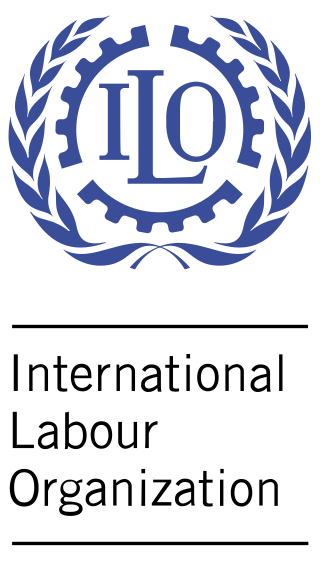
The International Labour Organization (ILO) is a United Nations agency whose mandate is to advance social and economic justice by setting international labour standards. Founded in October 1919 under the League of Nations, it is one of the first and oldest specialised agencies of the UN. The ILO has 187 member states: 186 out of 193 UN member states plus the Cook Islands. It is headquartered in Geneva, Switzerland, with around 40 field offices around the world, and employs some 3,381 staff across 107 nations, of whom 1,698 work in technical cooperation programmes and projects.
A trade union or labor union, often simply referred to as a union, is an organisation of workers intent on "maintaining or improving the conditions of their employment," such as attaining better wages and benefits, improving working conditions, improving safety standards, establishing complaint procedures, developing rules governing status of employees and protecting and increasing the bargaining power of workers.

Unemployment, according to the OECD, is people above a specified age not being in paid employment or self-employment but currently available for work during the reference period.
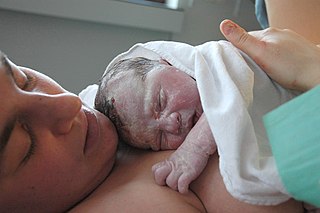
Childbirth, also known as labour, parturition and delivery, is the completion of pregnancy where one or more babies exits the internal environment of the mother via vaginal delivery or caesarean section. In 2019, there were about 140.11 million human births globally. In the developed countries, most deliveries occur in hospitals, while in the developing countries most are home births.

Debt bondage, also known as debt slavery, bonded labour, or peonage, is the pledge of a person's services as security for the repayment for a debt or other obligation. Where the terms of the repayment are not clearly or reasonably stated, the person who holds the debt has thus some control over the laborer, whose freedom depends on the undefined debt repayment. The services required to repay the debt may be undefined, and the services' duration may be undefined, thus allowing the person supposedly owed the debt to demand services indefinitely. Debt bondage can be passed on from generation to generation.

Child labour is the exploitation of children through any form of work that deprives them of their childhood, interferes with their ability to attend regular school, or is mentally, physically, socially and morally harmful. Such exploitation is prohibited by legislation worldwide, although these laws do not consider all work by children as child labour; exceptions include work by child artists, family duties, supervised training, and some forms of work undertaken by Amish children, as well as by indigenous children in the Americas.

Human migration is the movement of people from one place to another with intentions of settling, permanently or temporarily, at a new location.

An inspection is, most generally, an organized examination or formal evaluation exercise. In engineering activities inspection involves the measurements, tests, and gauges applied to certain characteristics in regard to an object or activity. The results are usually compared to specified requirements and standards for determining whether the item or activity is in line with these targets, often with a Standard Inspection Procedure in place to ensure consistent checking. Inspections are usually non-destructive.
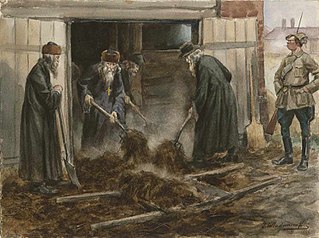
Forced labour, or unfree labour, is any work relation, especially in modern or early modern history, in which people are employed against their will with the threat of destitution, detention, violence including death or other forms of extreme hardship to either themselves or members of their families.
Labour history or labor history is a sub-discipline of social history which specialises on the history of the working classes and the labour movement. Labour historians may concern themselves with issues of gender, race, ethnicity, and other factors besides class but chiefly focus on urban or industrial societies which distinguishes it from rural history.

A strikebreaker is a person who works despite a strike. Strikebreakers are usually individuals who were not employed by the company before the trade union dispute but hired after or during the strike to keep the organization running. Strikebreakers may also refer to workers who cross picket lines to work.
His Excellency Mahinda Buddhadasa Samarasinghe, is a former MP and the current Ambassador of Sri Lanka to the United States and Mexico and High Commissioner to Trinidad and Tobago.
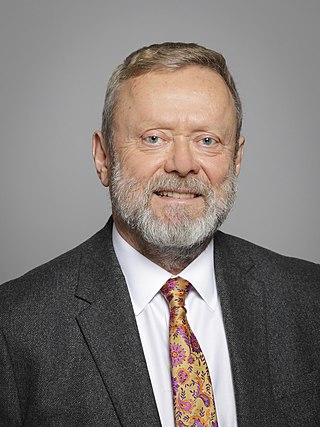
Ray Edward Harry Collins, Baron Collins of Highbury is a British politician and trade unionist serving as a Member of the House of Lords since 2011. A member of the Labour Party, he served as General Secretary of the Party from 2008 to 2011. Collins has been Shadow Deputy Leader of the House of Lords since 2021.
The Labour Party is a political party in the United Kingdom that has been described as an alliance of social democrats, democratic socialists, and trade unionists. The Labour Party sits on the centre-left of the political spectrum. In all general elections since 1922, Labour has been either the governing party or the Official Opposition. There have been six Labour prime ministers and thirteen Labour ministries. Since the 2010 general election, it has been the second-largest UK political party by the number of votes cast, behind the Conservative Party and ahead of the Liberal Democrats. The party holds the annual Labour Party Conference, at which party policy is formulated.

The Fabian Society is a British socialist organisation whose purpose is to advance the principles of social democracy and democratic socialism via gradualist and reformist effort in democracies, rather than by revolutionary overthrow. The Fabian Society was also historically related to radicalism, a left-wing liberal tradition.

Human trafficking is the trade of humans for the purpose of forced labour, sexual slavery, or commercial sexual exploitation. Human trafficking can occur within a country or trans-nationally. It is distinct from people smuggling, which is characterized by the consent of the person being smuggled.
In sociology, the term ethnic penalty is used in reference to the economic and non-economic disadvantages that ethnic minorities experience in the labour market compared to other ethnic groups. As an area of study among behavioral economists, psychologists, and sociologists, it ranges beyond discrimination so non-cognitive factors can also be taken into consideration in order to explain why unwarranted differences exist between individuals with similar abilities because they are members of different ethnicities.
The Workers Revolutionary Party is a Trotskyist group in Britain once led by Gerry Healy. In the mid-1980s, it split into several smaller groups, one of which retains possession of the name.
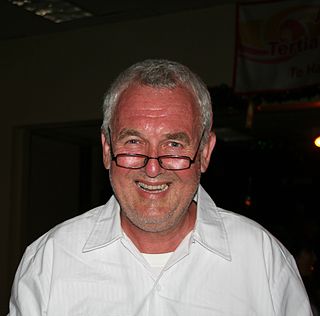
Nigel Anthony Fell Haworth is a New Zealand economics academic and politician. He was elected President of the New Zealand Labour Party in February 2015, succeeding Moira Coatsworth.











